One of the most difficult parts of earning U.S. citizenship is mastering the English language.
Socorro Cardoso found help through the English as a Second Language program hosted at the Moniteau County Library @ Wood Place. And retired elementary school teacher Kathy Burns invested her personal time working with Cardoso and dozens of other Spanish-speaking residents.
The content of the written tests, administered in Kansas City at the American Immigration Center, would challenge most life-long Americans. And the oral tests often deliberately are worded to not be easy, Burns said.
"It takes confidence, English and a good memory," she said.
The personal commitment required to complete the U.S. naturalization process can be daunting. And not all who start the process will finish, she said.
"Bravo to those who did it; it took a lot of hard work," Burns said.
Beyond the learning, the fees are not cheap.
For those like Cardoso and Fernando Cisneros, the benefits once they were sworn in outweighed the obstacles.
Cardoso's youngest two children, under the age of 18, were able to also attain citizenship because of her work. And her mother finally was able to travel from Mexico to visit her family, which had relocated to the U.S. many years earlier.
Cisneros said he has a special pride about being an American. Although he has lived in California since he was a toddler, completing the process was important for his children, too, his wife, Kimberly, said.
"I feel like we live in a great country," Cisneros said.
Both Cisneros and Cardoso agreed citizenship also has helped them with better employment opportunities.
Most hispanics Burns has met are seeking citizenship for work, a better education for their children and better opportunities, she said.
Many she has helped only had the equivalent of an elementary education, but they are hardworkers, Burns said.
Cardoso's husband, Lucio, moved to Mid-Missouri for work years before she was able to obtain a visa to join him from Mexico. After that, she held a permanent residency card for five years to become eligible for citizenship, she said.
"Often women eventually get their card through their husband," Burns said.
Once eligible, potential citizens, like Cardoso, then pay more than $600 for the application fee. That's after $500 for their permanent residency card.
They must travel a minimum of three times to Kansas City, which for some is a hardship. But for many, Burns has provided their transportation. The first visit takes five minutes to take their fingerprints, the second for the testing and the third is the final swearing in.
Then, some, like Cisneros, invest in a lawyer to ensure all their paperwork, including the 21-page application, is in order. And then they may have additional fees.
After that, it's studying and practicing.
From time to time, Burns will host weekly study groups to help applicants with both their English and the historical facts.
"We practice until it's automatic," she said.
The written test and a read-aloud sentence are intended to prove one knows English, Cisneros said.
While working at a local industry, he said he wore headphones under his helmet to listen to English recordings.
Cardoso was part of a group all pursuing citizenship at the same time. Burns said that usually works well as they motivate one another and it makes the learning fun.
In the last eight years, Burns said she has helped more than 30 adults earn their citizenship.
"It's important to have someone like Karen," Cisneros said. "The (tester) I got was looking for a reason not to (approve) me; she got me ready for what to expect."
Cardoso agreed that Burns' support was an important motivator to keep at the process.
"If it wouldn't have been for Karen, I wouldn't be a citizens," Cardoso said.
Burns said the work is rewarding.
She hopes more Mid-Missourians realize "it's not easy to get legal status in this country.
"Once they get that, they have to jump through all the hoops necessary and pay all the money.
"They need applause for working as hard as they do. We take for granted things they worked very hard for."
Link:

